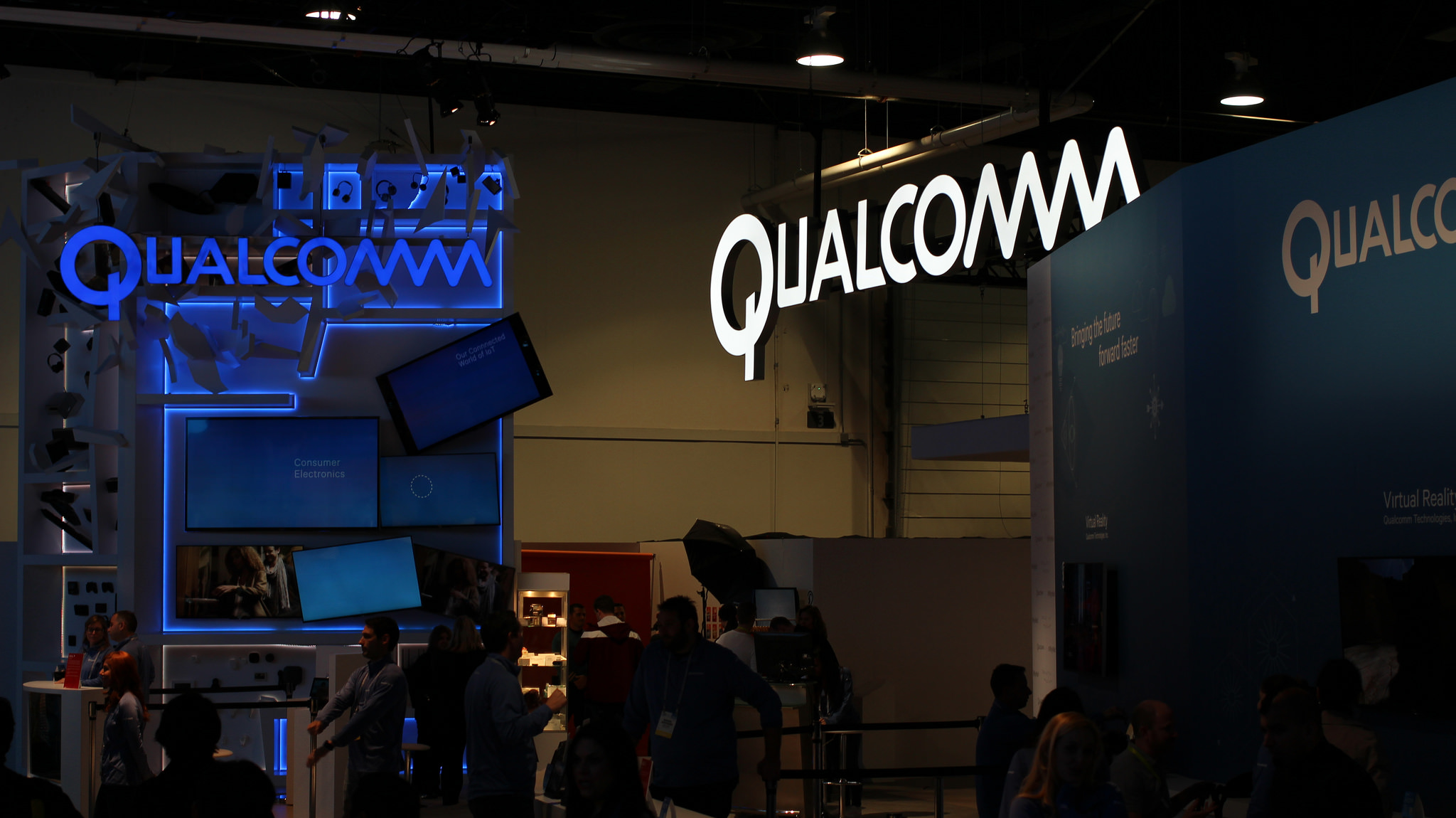 INFRA
INFRA
 INFRA
INFRA
 INFRA
INFRA
Updated
Qualcomm Technologies Inc.’s performance in its fiscal fourth quarter was overshadowed by its ongoing legal battles with Apple Inc., but at least it was better news on a tough day for the mobile chipmaker.
The company beat expectations, but it forecast sales revenue for the coming quarter that came in below analysts’ estimates, mainly from the loss of chip sales to the iPhone maker.
For the quarter just gone, Qualcomm did fairly well, reporting a profit before certain costs such as stock compensation of 90 cents per share on revenue of $5.8 billion, down 2 percent from one year ago. The performance was better than expected, since Wall Street was looking for earnings of 83 cents per share on revenue of $5.52 billion. For its full fiscal year, Qualcomm posted a $3.69-a-share profit on revenue of $22.7 billion.
The sting came with its guidance for the current quarter. Qualcomm executives said they were expecting earnings of between $1.05 to $1.15 per share on revenue of $5.3 billion. Wall Street analysts are forecasting earnings of 95 cents per share on revenue of $5.57 billion.
The lower revenue guidance had an immediate impact on Qualcomm’s stock, which fell almost 5 percent in after-hours trading as some investors rushed to sell off their holdings. Update: On Thursday, shares were falling 7 percent.
Qualcomm remains the world’s largest supplier of computer chips for smartphones and other mobile devices, but has been left reeling by its dispute with Apple over patent royalties that saw it lose the iPhone maker as a customer. In September Apple dropped Qualcomm as the supplier of chips for its new iPhone models the XS, XS Max and XR, instead choosing to go with rival Intel Corp.’s modem chips. Qualcomm executives had previously warned investors that such a move was likely, but the impact is now being felt more keenly with the company’s latest guidance.
The dispute with Apple has also strangled revenue from Qualcomm Technology Licensing, which is the company’s patent licensing business. QTL accounts for a large portion of Qualcomm’s revenue but did not record any numbers for the royalties it was due on the sales of Apple products in fiscal 2018.
Partly as a result, QTL’s revenue for the last quarter fell by 6 percent from a year ago. The unit pulled in $739 million in earnings before taxes, down 11 percent year-over-year. Operating losses came in at $700 million, way up from $300 million a year ago.
“Qualcomm’s business model on the licensing side is always a roller coaster ride,” said Holger Mueller, principal analyst at Constellation Research Inc. “It does not change the fundamental [leadership] position Qualcomm has in R&D, current chip business and intellectual property, but it may have to fight a little harder to keep the IP licensing revenue flowing.”
At least Qualcomm’s main business segment, Qualcomm CDA Technologies, did much better. Fourth-quarter revenue rose 14 percent, to $4.65 billion. Earnings before taxes came in at $796 million, down 18 percent from one year ago.
“Qualcomm’s earnings report found the chipmaker suffering a one-two punch of sorts,” said Charles King, an analyst with Pund-IT Inc. “First and foremost, the impact of the company’s severed relationship [with Apple] became fully apparent, dragging down its overall revenues for the quarter. Earnings were above analysts’ expectations, though those profits were bolstered by a one-time tax benefit of around 45 cents per share.”
Qualcomm’s legal troubles look unlikely to end anytime soon. Earlier today, Reuters reported that there is “absolutely no meaningful discussion” between the chip maker and Apple over a possible settlement, and that Apple is reportedly “gearing up for trial.”
The legal wranglings have forced Qualcomm to try to offset some of its losses by signing more deals with its other customers, allowing them to pay lower patent licensing fees than before, Reuters reported. The company has also looked to forge new deals and partnerships with customers such as Samsung Electronics Co. Ltd. and Chinese phone makers such as Xiaomi Corp.
Qualcomm is also likely to benefit significantly from the rollout of 5G networks from next year, King said. “However, those opportunities aren’t likely to manifest for a year or more, leaving Qualcomm’s short-term outlook cloudy,” he added.
The company has also responded by stepping up its efforts to get its chips into new and emerging markets such as Wi-Fi, automotive and the “internet of things,” Reuters said.
Patrick Moorhead, president and principal analyst at Moor Insights & Strategy, said Qualcomm’s most recent quarter suggests this strategy is working even if shareholders are getting twitchy.
“Qualcomm exceeded much of its guidance for the past quarter and while revenue slipped a bit, this is incredible when you consider it lost the Apple business and Apple still hasn’t paid its $7 billion license bill,” Moorhead said. “This says that Qualcomm’s expansion into RF, WiFi, automotive and IoT is working, just not enough to replace all of the Apple losses. Investors were a bit disappointed at future guidance, it is as simple as that.”
THANK YOU